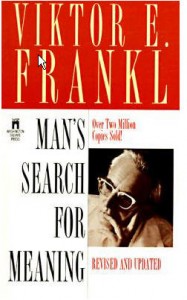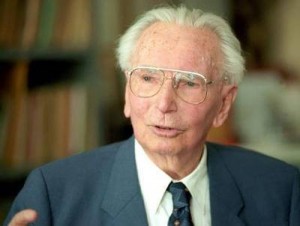 “We who lived in concentration camps can remember the men who walked through huts comforting others, giving away their last piece of bread. They may have been few in number, but they offer sufficient proof that everything can be taken from man but one thing: the last of the human freedoms – to choose one’s attitude in any given set of circumstances, to choose one’s own way.”
“We who lived in concentration camps can remember the men who walked through huts comforting others, giving away their last piece of bread. They may have been few in number, but they offer sufficient proof that everything can be taken from man but one thing: the last of the human freedoms – to choose one’s attitude in any given set of circumstances, to choose one’s own way.”
Dr. Victor Frankl, who fathered the “Third School of Viennese Psychiatry,” known “logotherapy”, experienced first-hand the horrible atrocities that were forced upon the Jews in Nazi Concentration Camps, and lived to tell about it.
He shares the truths he learned as a prisoner, including man’s search for meaning in life, and his ability to survive extreme physical and emotional hardships, despite the odds. At the root of the theory is the value of helping others find their unique purpose or mission in life.
Frankl wrote seventeen volumes in German on the principles of logotherapy which he weaves into this short book.
What was the key to the survival in the Nazi death camps? It wasn’t survival of the fittest in the traditional sense of those who were the most physically robust of the human species. Rather it tended to be those individuals, described below, who found inner survival strength as follows:
(1) Those who had a meaning in life, a sense of purpose, or intent to accomplish a goal. It was Dr. Frankl’s desire to survive the death camps so that he could write and publish his experiences and truths learned through his suffering.
(2) Those who had a spiritual belief in God and a faith that there was a divine plan for them. They believed God would help them through their difficulties. Dr. Frankl said: “In spite of all the enforced physical and mental primitiveness of the life in a concentration camp, it was possible for spiritual life to deepen.”
(3) Those who had an intellectual life to fall back on (in their thoughts) during the monotonous, strenuous, and most painful times of endurance. He states: “Sensitive people who were used to a rich intellectual life may have suffered much pain… but the damage to their inner selves was less. They were able to retreat from their terrible surroundings to a life of inner riches and spiritual freedom.” This was something their oppressors were not able to take away from them.
selves was less. They were able to retreat from their terrible surroundings to a life of inner riches and spiritual freedom.” This was something their oppressors were not able to take away from them.
(4) Those who held on to the cherished bonds of loved ones. Dr. Frankl often found strength by carrying on imagined conversations with his beloved wife who had been taken to another death camp. His ability to communicate his love for her in his thoughts, and receive back her love, gave him the incentive to hold on to life during the toughtest of times. Unfortunately his wife was not able to survive, but he didn’t know this at the time. (Perhaps it was her Spirit he was communicating with afterall.)
Dr. Frankl tells of a few of the prisoners, who despite being in a starving and sickly state, managed to go around offering aid and moral encouragement to others. Such individuals often gave of their meager piece of daily bread to keep another fellow prisoner alive. Such selfless service in the face of death, was truly admirable.
In the second half of Dr. Frankl’s book he distinguishes the difference between his theory of logotherapy and that of traditional approaches to physcho-analysis. At the core of his theory is the challenge to help individuals discover for themselves their reason for being, even a worthwhile goal. He quotes Nietzche who said: “He who has a why to live for can bear almost any how.” Dr. Frankl says: “The meaning of life always changes, but it never ceases to be.”
This book can be a great resource for readers to evaluate their own purpose in life, and perhaps in the process choose a path that is worthwhile not only to them but that will benefit others as well.
I have read this book a number of times and find that each time I gain a new insight.










Wow, you’re blog is a great resource. I’m enjoying it and this is a well-written article.